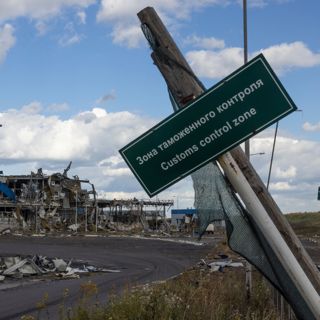
Inside Ukraine’s Invasion of Russia
Warning: this episode contains descriptions of war.When Ukrainian troops crossed over into Russia two weeks ago, it appeared at first to be a largely symbolic gesture. But in the time since, it has emerged as a potentially pivotal moment in the war.Andrew Kramer, the Kyiv bureau chief for The Times, explains what’s behind the audacious Ukrainian operation, and Anton Troianovski, the Moscow bureau chief, explains how Russia’s response could reshape the conflict.Guest: Andrew E. Kramer, the Kyiv bureau chief for The New York Times.Anton Troianovski, the Moscow bureau chief for The New York Times.Background reading: Planned in secrecy, the incursion was a bold move to upend the war’s dynamics and put Moscow on the defensive — a gambit that could also leave Ukraine exposed.President Volodymyr Zelensky wants to hold Russian territory as leverage in future talks. In Moscow, many doubt the strategy.For more information on today’s episode, visit nytimes.com/thedaily. Transcripts of each episode will be made available by the next workday. Subscribe today at nytimes.com/podcasts or on Apple Podcasts and Spotify. You can also subscribe via your favorite podcast app here https://www.nytimes.com/activate-access/audio?source=podcatcher. For more podcasts and narrated articles, download The New York Times app at nytimes.com/app.
21 Aug 202426min

Biden Leaves the Stage
On the first night of the Democratic National Convention, the stage belonged to the man who chose to give it up.Katie Rogers and Peter Baker, White House correspondents for The Times, discuss President Biden’s private pain since stepping aside, and his public message in Chicago.Guest: Katie Rogers, a White House correspondent for The New York Times.Peter Baker, the chief White House correspondent for The New York Times.Background reading: Biden defended his record and endorsed Kamala Harris: “America, I gave my best to you.”Analysis: The speech Biden never wanted to give.For more information on today’s episode, visit nytimes.com/thedaily. Transcripts of each episode will be made available by the next workday. Subscribe today at nytimes.com/podcasts or on Apple Podcasts and Spotify. You can also subscribe via your favorite podcast app here https://www.nytimes.com/activate-access/audio?source=podcatcher. For more podcasts and narrated articles, download The New York Times app at nytimes.com/app.
20 Aug 202433min

The Story of Kamala Harris
Over the next few days at the Democratic National Convention, Vice President Kamala Harris will accept her party’s nomination and reintroduce herself to American voters.Astead W. Herndon, a national politics reporter and the host of the politics podcast “The Run-Up,” talks through key periods in Ms. Harris’s life that explain what she believes and the kind of president she might become.Guest: Astead W. Herndon, a national politics reporter and the host of the politics podcast “The Run-Up” for The New York Times.Background reading: A vice-presidential learning curve: How Ms. Harris picked her shots.Nearly 14 years ago, Ms. Harris’s opponent in the California attorney general’s race gave an answer at a debate that was frank — and fateful for the future Democratic presidential nominee.For more information on today’s episode, visit nytimes.com/thedaily. Transcripts of each episode will be made available by the next workday. Subscribe today at nytimes.com/podcasts or on Apple Podcasts and Spotify. You can also subscribe via your favorite podcast app here https://www.nytimes.com/activate-access/audio?source=podcatcher. For more podcasts and narrated articles, download The New York Times app at nytimes.com/app.
19 Aug 202442min

The Sunday Read: ‘The Man Who Couldn’t Stop Going to College’
Benjamin B. Bolger has been to Harvard and Stanford and Yale. He has been to Columbia and Dartmouth and Oxford, and Cambridge, Brandeis and Brown. Over all, Bolger has 14 advanced degrees, plus an associate’s and a bachelor’s.Against a backdrop of pervasive cynicism about the nature of higher education, it is tempting to dismiss a figure like Bolger as the wacky byproduct of an empty system. Then again, Bolger has run himself through that system, over and over and over again; it continues to take him in, and he continues to return to it for more. Subscribe today at nytimes.com/podcasts or on Apple Podcasts and Spotify. You can also subscribe via your favorite podcast app here https://www.nytimes.com/activate-access/audio?source=podcatcher. For more podcasts and narrated articles, download The New York Times app at nytimes.com/app.
18 Aug 202425min

'The Interview': Jelly Roll Cannot Believe How His Life Turned Out
From jail and addiction to music stardom — the singer tells David Marchese he’s living a “modern American fairy tale.” Subscribe today at nytimes.com/podcasts or on Apple Podcasts and Spotify. You can also subscribe via your favorite podcast app here https://www.nytimes.com/activate-access/audio?source=podcatcher. For more podcasts and narrated articles, download The New York Times app at nytimes.com/app.
17 Aug 202437min

How Air-Conditioning Conquered America
Air-conditioning has become both our answer to a warming planet and a major obstacle to actually confronting it.Emily Badger, who covers cities and urban policy for The Times, explains the increasingly dangerous paradox of trying to control the temperature.Guest: Emily Badger, who covers cities and urban policy for The New York Times.Background reading: From 2017: How air-conditioning conquered America.Air-conditioning use will surge in a warming world, the U.N. has warned.For more information on today’s episode, visit nytimes.com/thedaily. Transcripts of each episode will be made available by the next workday. Subscribe today at nytimes.com/podcasts or on Apple Podcasts and Spotify. You can also subscribe via your favorite podcast app here https://www.nytimes.com/activate-access/audio?source=podcatcher. For more podcasts and narrated articles, download The New York Times app at nytimes.com/app.
16 Aug 202426min

A Controversial Crackdown on Homeless Encampments
In the weeks since a landmark Supreme Court ruling opened the door for cities and states to crack down on homeless encampments, California — the state with the largest homeless population — has taken some of the nation’s most sweeping actions against them.Shawn Hubler, who covers California for The Times, discusses the race to clean up what has become one of the Democratic Party’s biggest vulnerabilities before Election Day.Guest: Shawn Hubler, a reporter covering California for The New York Times.Background reading: Gov. Gavin Newsom cleared homeless camps in L.A. county, where he wants more “urgency.”Mr. Newsom ordered California officials to remove homeless encampments.For more information on today’s episode, visit nytimes.com/thedaily. Transcripts of each episode will be made available by the next workday. Subscribe today at nytimes.com/podcasts or on Apple Podcasts and Spotify. You can also subscribe via your favorite podcast app here https://www.nytimes.com/activate-access/audio?source=podcatcher. For more podcasts and narrated articles, download The New York Times app at nytimes.com/app.
15 Aug 202423min

How One Tech Monopoly Paved the Way for Another
In a landmark antitrust ruling against Google last week, another case was at the heart of the story — one from the 1990s.Steve Lohr, who covers technology and the economy for The Times, explains the influence of United States v. Microsoft and what lessons that case might hold for the future of Big Tech today.Guest: Steve Lohr, who covers technology, the economy and work for The New York Times.Background reading: How the Google antitrust ruling may influence tech competition.The ruling on Google’s search dominance was the first antitrust decision of the modern internet era in a case against a technology giant.For more information on today’s episode, visit nytimes.com/thedaily. Transcripts of each episode will be made available by the next workday. Subscribe today at nytimes.com/podcasts or on Apple Podcasts and Spotify. You can also subscribe via your favorite podcast app here https://www.nytimes.com/activate-access/audio?source=podcatcher. For more podcasts and narrated articles, download The New York Times app at nytimes.com/app.
14 Aug 202424min






















